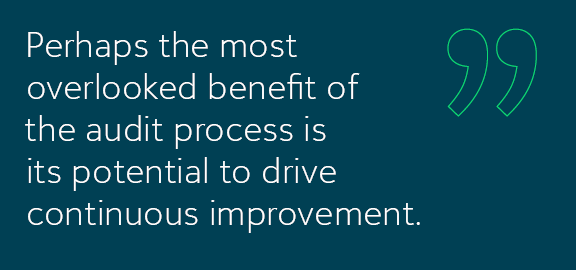How Private K–12 Schools Can Prepare for and Ace Their Financial Audit

For many private K-12 business office teams, the annual financial audit conjures up visions of long nights tracking down receipts, endless back-and-forth email chains, and the anxious wait for the final report.
But what if audit season could become a time of clarity, collaboration, and even calm? With the right mindset and tools, your next audit can do more than clear a compliance hurdle. Your annual financial audit can move your school’s mission forward.
Rethinking the Financial Audit Process for Your School
Audits aren’t gotchas—they are an opportunity for learning and improvement. They help your school demonstrate financial transparency to boards, donors, families, and accrediting agencies and ensure compliance with state regulations and grant requirements. Doing regular financial audits supports your school’s long-term financial agility and strategic planning by making sure your systems and processes promote accuracy and transparency.
What Makes Audits Stressful for Private K–12 Schools
For many private school business offices, stress around audits doesn’t come from a single source. It’s a combination of challenges that build up as audit season approaches. One of the biggest obstacles is the use of separate systems for tuition, fundraising, and accounting. When financial data is scattered across platforms, gathering the right information can become an exhausting scavenger hunt, with critical documents hiding in email attachments or lost spreadsheets.
Manual processes add another layer of complexity. Tracking restricted gifts or endowment spending by hand not only leaves room for error but also consumes valuable staff time. When schools lack clear internal controls, or when board oversight is inconsistent, it’s easy for important details to slip through the cracks. These gaps can quickly become red flags for auditors and make the process more stressful for everyone involved.
Compounding these issues are outstanding deficiencies from previous audits. If unresolved, they linger from year to year, casting a shadow over each new audit season. Rather than serving as a stepping stone for improvement, the audit becomes a dreaded hurdle—a cycle that drains both morale and resources.
Addressing these challenges requires more than just meeting the minimum requirements. By thoughtfully integrating systems, streamlining manual processes, and clarifying oversight and controls, schools can transform audit season from a source of stress into a strategic driver for continual improvement and success.
Planning for Success: Timeline & Phases
Successful audits don’t happen by accident—they’re the result of intentional preparation and a thoughtful approach to each phase. By viewing the audit as a year-round process rather than a single event, your team can transform audit season from a sprint to a series of manageable, strategic steps.
Three Phases of Your Financial Audit
Your financial audit happens in three phases:
- Planning: You build your Prepared by Client (PBC) list, coordinate timelines with your audit firm, and resolve any anomalies in your financial records.
- Fieldwork: During fieldwork, you provide auditors with access to tuition records, payroll data, and grant documentation. Hopefully your auditors have view-only access to your systems, so it won’t require much more than regular check-ins throughout the process.
- Reporting: This phase is when your auditors present the audit findings to your team for an initial review and then your board and leadership team. This is also where you create an action plan to address any deficiencies.
The All-Important Reconciliations
Complete these tasks to help you get ready for your audit and possibly spot any variances before the audit begins.
- Reconcile tuition receivables and financial aid adjustments.
- Finalize payroll entries, including summer pay and stipends.
- Confirm that endowment spending aligns with donor restrictions.
- Run financial statements, including the Statement of Financial Position and Statement of Activities.
- Ensure grant reporting is complete and up to date.
- Review and update board meeting minutes and governance documents.
By tackling these tasks ahead of time, you’ll be better equipped to provide accurate and complete information to your auditors.
Strengthening Your Business Office’s Internal Controls
Internal controls are often a focus area for financial audits, and a common area for deficiencies in the final report.
Strong internal controls protect tuition and donations from potential misuse, ensure that grants and donor funds are used as intended, and help your school meet all compliance requirements. To make your audit faster, review and update your internal controls before the audit begins, including:
- Tuition and fees: Segregation of duties between billing, collection, and reconciliation
- Fundraising and endowments: Document donor restrictions and track usage
- Grants: Maintain documentation for allowable expenses and reporting
- Payroll: Ensure proper authorization for stipends, bonuses, and benefits
- Board oversight: Regular review of financials and audit findings
By embedding these controls in your daily and monthly routines, you create a safer, more resilient financial foundation for your school.
Leveraging Technology for Audit Success
Manual processes can bog down your workflow and increase the risk of errors. The business offices that breeze through audits are often those that have embraced technology. Here are a few ways to leverage your technology to make your audit—and day-to-day operations—easier:
- Integrate your tuition management and fund accounting systems so information flows seamlessly, reducing manual entry and associated mistakes.
- Set a requirement in your fund accounting system so anyone submitting expenses must attach invoices or receipts directly to the expense report, eliminating last-minute paperwork hunts.
- Give auditors view-only access and role-based dashboards for immediate visibility into reports, avoiding endless email threads.
- Use templated reports and chart organizers to help you generate audit-ready statements quickly and use automated workflows for accounts payable and approvals to ensure that every transaction leaves a clear digital trail.
By investing in the right tools, your team can reclaim precious time and focus on what matters most—supporting your students and mission.
Building a Relationship with Your Audit Firm
Your auditor is not the villain in your business office story. If they are, you need a new auditor. The right audit partner can be one of your school’s biggest allies.
Start by selecting an audit firm with deep experience in independent schools and the complexities of fund accounting. Make sure they understand your tuition management systems and how to track and report on restricted funds.
Set clear expectations for timelines, information requests, and fieldwork schedules. When new auditors join your team, consider offering a system overview and a concise “cheat sheet” outlining your account structure and naming conventions.
Most importantly, don’t wait until next year’s audit—schedule quarterly check-ins to discuss tax changes and keep your auditor informed about any shifts in systems, staff, or revenue. This collaborative approach builds trust and helps everyone stay ahead of potential challenges.
Using Your Audit for Continuous Improvement
Perhaps the most overlooked benefit of the audit process is its potential to drive continuous improvement. Encourage a culture of transparency and accountability across all departments by using audit findings as a springboard for process enhancement.
Whether it’s better tracking for financial aid, tighter controls on endowment spending, or aligning audit outcomes with strategic goals, each audit brings valuable insights. Annually reassess your risks and update internal controls so your school is always one step ahead of emerging challenges.

Your Next Audit: A Strategic Advantage
With the right preparation, technology, and auditor partnership, your school’s next financial audit can be so much more than a requirement. It can be a strategic advantage—a chance to build trust, secure resources, and set your school up for sustainable success.
Ready to see how purpose-built fund accounting software like Blackbaud Financial Edge NXT® can simplify every step of your audit? Check out the datasheet, Simplifying Your Financial Audit with Blackbaud Financial Edge NXT.



